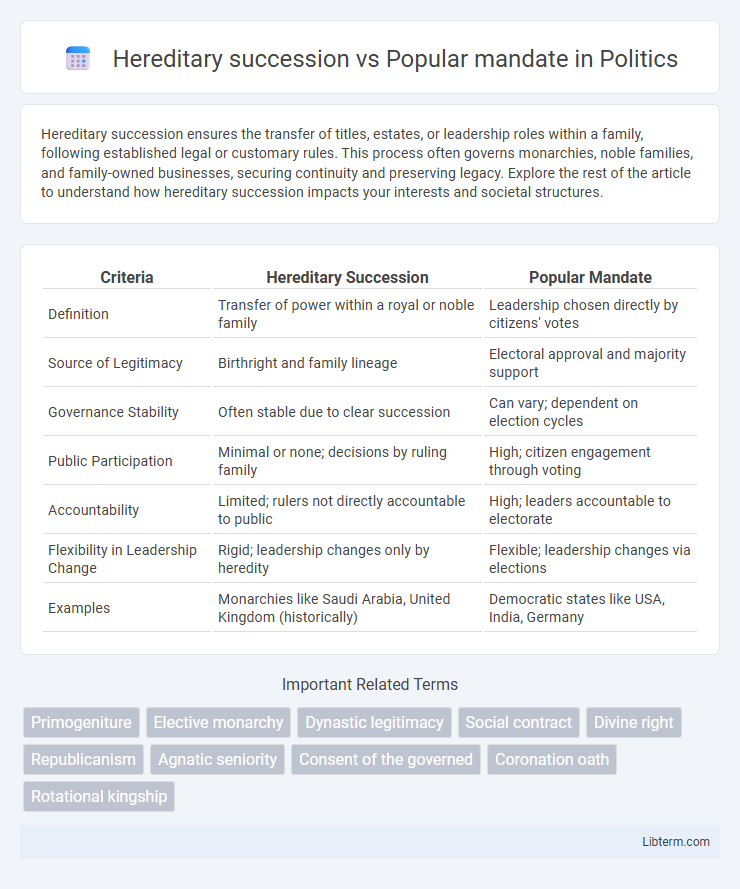Hereditary succession ensures the transfer of titles, estates, or leadership roles within a family, following established legal or customary rules. This process often governs monarchies, noble families, and family-owned businesses, securing continuity and preserving legacy. Explore the rest of the article to understand how hereditary succession impacts your interests and societal structures.
Table of Comparison
| Criteria | Hereditary Succession | Popular Mandate |
|---|---|---|
| Definition | Transfer of power within a royal or noble family | Leadership chosen directly by citizens' votes |
| Source of Legitimacy | Birthright and family lineage | Electoral approval and majority support |
| Governance Stability | Often stable due to clear succession | Can vary; dependent on election cycles |
| Public Participation | Minimal or none; decisions by ruling family | High; citizen engagement through voting |
| Accountability | Limited; rulers not directly accountable to public | High; leaders accountable to electorate |
| Flexibility in Leadership Change | Rigid; leadership changes only by heredity | Flexible; leadership changes via elections |
| Examples | Monarchies like Saudi Arabia, United Kingdom (historically) | Democratic states like USA, India, Germany |
Understanding Hereditary Succession
Hereditary succession is a system of political or monarchical power transfer where authority is passed down through family lineage, typically from parent to child, ensuring continuity of leadership within a specific dynasty. This contrasts with popular mandate, which derives legitimacy from the electorate's choice, often through voting processes in democratic systems. Understanding hereditary succession involves analyzing its role in maintaining stability, preserving tradition, and sometimes limiting political pluralism due to the concentration of power within a single familial line.
Defining Popular Mandate
Popular mandate refers to the authority granted to a leader or government through direct election by the people, reflecting the collective will and democratic consent of the population. It contrasts with hereditary succession, where power is passed down through family lineage without direct public approval. The legitimacy of a popular mandate hinges on transparent electoral processes, widespread voter participation, and adherence to democratic principles.
Historical Origins of Leadership Transition
Hereditary succession, rooted in ancient monarchies, transfers leadership through family lineage, often justified by divine right or bloodline legitimacy, exemplified by European dynasties such as the Tudors and Habsburgs. Popular mandate emerged with the rise of democratic ideals in the Enlightenment era, emphasizing leadership chosen by the people through elections, as seen in the formation of the United States government post-1776. The historical origins highlight a transition from unquestioned royal authority towards representative governance reflecting societal calls for accountability and public consent.
Legitimacy: Bloodline vs. Public Choice
Legitimacy in hereditary succession derives from bloodline, where authority is inherited through family lineage, often perceived as divinely or traditionally sanctioned. In contrast, legitimacy under popular mandate is rooted in public choice, where leaders gain authority through elections and the consent of the governed, reflecting democratic principles. The fundamental distinction lies in hereditary rule's emphasis on continuity and tradition, whereas popular mandate prioritizes representation and accountability.
Political Stability and Governance
Hereditary succession often ensures political stability by providing a clear, predetermined line of authority that reduces power struggles and uncertainty in leadership transitions. In contrast, popular mandate emphasizes governance legitimacy through elections, fostering accountability but sometimes leading to political instability due to contested results or frequent changes in leadership. Both systems impact governance effectiveness differently, with hereditary succession prioritizing continuity and popular mandate focusing on representativeness and responsiveness to public demands.
Accountability and Representation
Hereditary succession often lacks direct accountability as power is transferred based on lineage rather than public consent, limiting representatives' responsiveness to citizens' needs. Popular mandate derives authority from elections, ensuring leaders are accountable to the electorate and must represent diverse societal interests to maintain support. This system enhances transparency and responsiveness, fostering government legitimacy through continual public endorsement.
Succession in Monarchy vs. Democracy
Hereditary succession in monarchy is based on lineage and family bloodlines, where power passes down through a ruling family, ensuring political continuity and stability within a specific dynasty. Popular mandate in democracy derives authority from the electorate's votes, granting leaders legitimacy through free and fair elections that reflect the will of the people. Succession in monarchy maintains centralized rule often without public consent, contrasting sharply with democratic succession that emphasizes accountability and representation through electoral processes.
Challenges and Criticisms
Hereditary succession faces challenges such as lack of meritocracy, limited public accountability, and potential for dynastic stagnation that can hinder adaptive governance. Popular mandates often encounter criticisms regarding electoral manipulation, short-term populism, and vulnerability to misinformation influencing voter decisions. Both systems raise debates about legitimacy, effectiveness in representing citizen interests, and stability in political leadership.
Modern Examples and Case Studies
Modern examples of hereditary succession include monarchies like Saudi Arabia and the United Arab Emirates, where leadership passes within ruling families, preserving traditional authority structures. In contrast, popular mandate systems such as those in democratic nations like the United States and India rely on elections to confer legitimacy and political power through the vote of the people. Case studies such as Jordan's monarchy demonstrate a blend of hereditary succession with popular elements, while Taiwan exemplifies the consolidation of popular mandate in maintaining democratic governance.
Future Trends in Leadership Succession
Future trends in leadership succession reveal a gradual shift from hereditary succession toward popular mandate systems driven by demands for transparency and accountability. Increasingly, organizations and nations adopt democratic processes that empower stakeholders through voting rights, reinforcing legitimacy and adaptability in leadership transitions. Technological advancements like blockchain and digital voting platforms further streamline popular mandate mechanisms, enhancing inclusivity and reducing risks of nepotism common in hereditary models.
Hereditary succession Infographic

 libterm.com
libterm.com